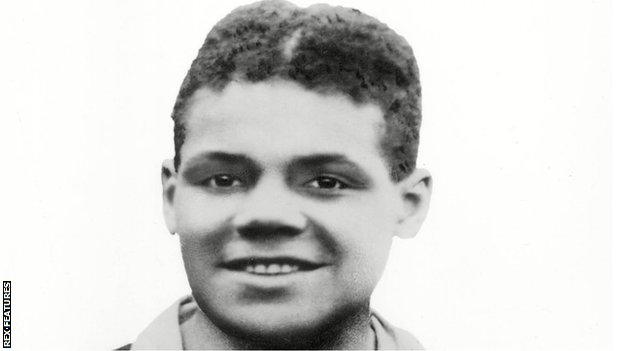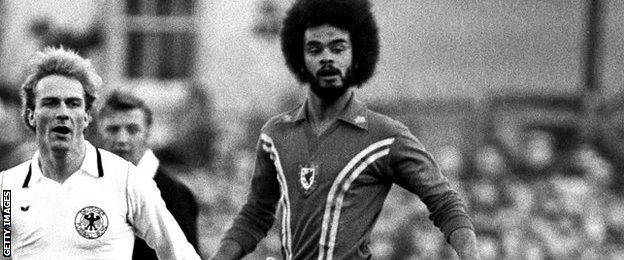Eddie Parris: The forgotten story of the first black footballer to play for Wales
- Published

Eddie Parris played for Bradford Park Avenue, Bournemouth and Luton Town
The distinctive afro haircut. The evocative tramlined kit. It's easy to see why the iconic image of George Berry in a Welsh shirt comes to mind when asked to name the first black footballer to play for Wales.
As far as many are concerned, the first of Berry's five caps in 1979 provided that landmark moment, six months on from Viv Anderson's debut for England.
And yet the real answer to the question lies a lot further back, almost half a century in fact - although very few are likely to know the name of Eddie Parris, the pioneer that Welsh football forgot.
Parris was 20 when he was called up to represent his country in a match away to Ireland in Belfast in 1931, a game Wales lost 4-0.
It would be his one and only international appearance and the significance of it was seemingly lost over the years.
"I think that's partly because he only won one cap, and that it was a long time ago," says Martin Johnes, professor of modern history at Swansea University.
"The reality is that if you asked people to name any Welsh player from the 1930s, they would struggle.
"So I think the fact that he isn't remembered isn't necessarily to do with race - but nonetheless, he was a pioneer; he was one of only two black players who were regulars within the Football League between the wars, and he was the first black player to play for Wales, which is a significant milestone."
His journey to that point began in Pwllmeyric, a village just south of the border town of Chepstow where Parris was born in January 1911. A mixed race family, his mother - Annie Clarke - and father - John Edward Parris, a telegraph wireman from Barbados - had married two years earlier.
At a time of racial tension, it is perhaps naive to think the young Parris had not encountered forms of prejudice in his formative years. In between Parris Sr serving as a signalman with the Royal Engineers in the First World War - for which he would go on to receive a Victory Medal - the family moved to and from Newport, the scene of race riots in 1919.
Likewise, it is almost inconceivable Parris would not have experienced racism as he began to carve out a career as a footballer. Playing for Chepstow Town in the Gloucestershire leagues at the age of 16, the left-winger was spotted and signed by Bradford Park Avenue. By 1929, he had made his debut in the Second Division.

George Berry has been wrongly identified as Wales' first black player
Press reports spoke of his speed, dribbling and ball control, the tabloids linked him with Everton. They would often mention his race.
And yet, there was little reference to it when he was called up by Wales in 1931, albeit the call would come at a time when the Football Association of Wales struggled to persuade English clubs to release players for international duty.
Newspapers in Newport concentrated on a "native of Chepstow" making the national squad, press in Yorkshire highlighted the achievement of a Bradford player being selected, rather than focusing on the colour of his skin.
But if his appearance in a disappointing defeat was ground-breaking, it was accompanied by silence rather than celebration.
There is no official marking of the occasion, as perhaps would happen today. Instead, the records of the FAW minutes held at the National Library of Wales in Aberystwyth do not appear to make any reference to Parris, let alone skin colour.
"It's very clear that nobody wants to make a big statement about inclusion or anything like that; it's easier just not to talk about it," suggests Johnes, who has profiled Parris in his academic paper 'Race, Archival Silences and a Black Footballer Between the Wars'.
"[For the newspapers] it's almost as if it raises too many complicated questions about what Welshness is, so we'll ignore it."
Indeed, the only reference to the match in the FAW minutes is to note that "our new caps against Ireland were routed" while one newspaper report said of Parris he was "not up to international standard". He would not play for Wales again.
"He's not one of the very best players around at the time, but it's clear he was talented and he certainly wasn't picked because Wales were desperate," adds Johnes.
"And I suppose the question is why he doesn't get capped more? Is it simply because the tensions with English clubs were resolved and Wales had more First Division players at their disposal? Or is it that race became part of the equation?"
Parris' thoughts not recorded
Johnes admits the question posed is difficult to answer. A contemporary of Parris - Plymouth forward Jack Leslie - was called as a reserve for England in 1925. He then disappears from the discussions, with suggestions that newspaper reports on his selection were inaccurate. Years later, however, Leslie would claim he had been dropped because he was black.
Parris died in 1971, seemingly without speaking publicly about his fleeting international experience, so his own thoughts on the matter - as well as any insight into racism he may have suffered during his career - are lost.
Surviving relative, nephew Graham Shaw, was still a young boy when Parris died and so his memories of his uncle are more about his generous personality and popularity in the towns of Yorkshire where he had met wife Agnes, admitting it was only later he discovered the extent of his significant story.
Given he married into a footballing family - with medals and international caps among the Shaw brothers - and that Parris was modest about his own achievements, not much was made of his footballing tale among the relatives.
"I remember this very happy, cheerful, amiable bloke who was very well regarded around the place," says Graham, adding he was also accepted into the family despite it being a time where inter-racial marriages were not commonplace.
"I think he and Agnes were undoubtedly very brave at that point in their lives because - especially where Agnes came from - it was extremely unusual, but he just got on [with life] and got on with everybody."
After his Wales appearance, moves to Bournemouth and Luton in the Football League followed before time in non-league and retirement from the sport, settling in Gloucestershire and going on to work at a local factory.
But it will be his status as the first black footballer to play for Wales 89 years ago that - eventually - he will be best remembered for, even if the significance was not acknowledged at the time.
"If people had made a big deal of it at the time then it creates a memory," adds Johnes.
"They didn't and he became quietly forgotten as a lot of players from that era did - but he does deserve to be remembered in a way that players, better players even, do not, because you can only imagine what he have must have had to overcome in his daily life."
Something his relative agrees with.
"It was only later I became aware of it and it is extremely significant," says nephew Graham, who says he does remember Parris being proud of his background and calling himself Welsh despite all his years in exile.
"I'm sure there must have been all sorts of abuse and racism at that time and he just got on with it and was successful in doing it.
"He is absolutely a pioneer and I agree he should be recognised for it."